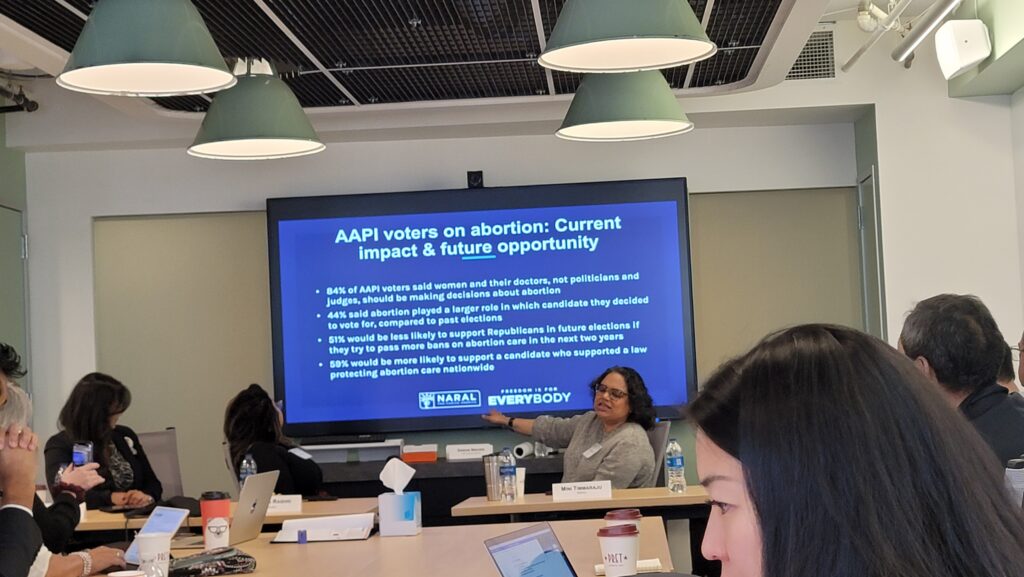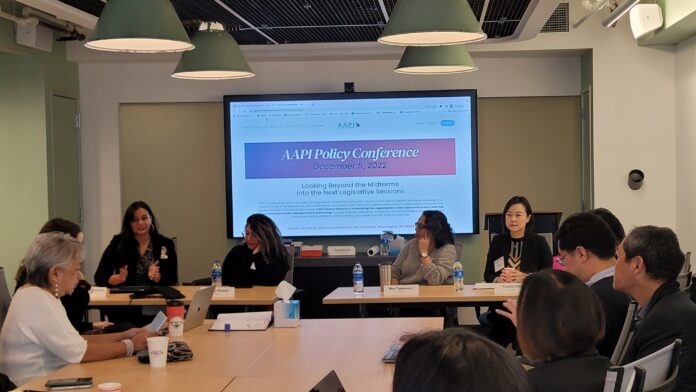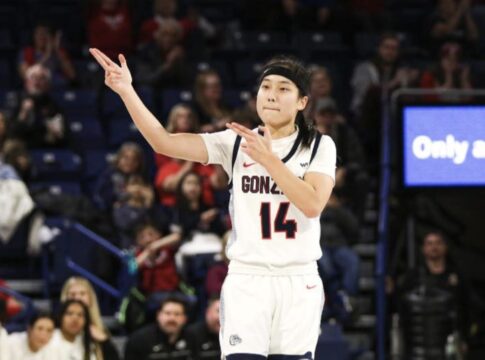By Jessica Xiao, AsAmNews Staff Contributor
Abortion rights continue to be challenged and dismantled across the country after the fall of Roe v. Wade. Today, AAPI reproductive justice and reproductive rights advocates gathered at a panel hosted by the AAPI Victory Alliance to express the importance of AAPI voices in public policy.
The panel was a part of the AAPI Victory Alliance’s AAPI Policy Conference “Looking Beyond the Midterms Into the Next Legislative Sessions” in Washington D.C.
Shreya Singh Hernandez, political director at the AAPI Victory Alliance and a researcher manager at the Aspen Institute, opened the conversation with a personal story about her mother, who had an abortion while newly immigrated to the United States.
“She, with me as a small child, decided to seek an important healthcare decision. It goes beyond data and abstract stories of why healthcare matters to our community – [reproductive justice] is deeply personal.”
LATEST STORIES
Throughout the conversation, personal storytelling was uplifted as an important tool to penetrate the larger national reproductive rights conversation, prevent anti-abortionists from weaponizing AAPI stereotypes against bodily autonomy and raise voter awareness by articulating the nuanced ways in which abortion policies impact AAPI communities.
Mini Timmaraju, President of NARAL Pro-Choice America, lauded NAPAWF’s (the National Asian Pacific American Women’s Forum) work in elevating stories with major impact – including that of Purvi Patel. In 2015, Patel was sentenced to 20 years for feticide in Indiana after attempting a self-abortion and experiencing a stillbirth. It became a pivotal case in the fight for abortion rights, used by anti-abortionists to fight for more restrictions on abortion access by claiming Patel’s abortion was sex-selective – a claim that was untrue, says Timmaraju, and weaponized for anti-abortion, detracting from reproductive justice issues and real issues of sex-selection and femicide in some AAPI communities and countries of origin.
Stories like Patel’s show how pregnant Asian Americans are at increased risk of criminalization for birth outcomes because of stereotypes like Asian American communities prefer sons over daughters, said Yvonne Hsu, Chief Policy and Government Affairs Officer at NAPAWF.
“That is not true – we know that’s not true. [These occurrences] heighten our fears about a traumatic experience in and of itself—we have to also worry about how it will be perceived by doctors, the medical community, and the law enforcement, and how it will be used against us. This is especially frightening for those who don’t have status. It is deeply hurtful for overpoliced communities like Black communities and Muslim communities,” said Hsu.
Reproductive justice is not only a salient issue, but a winning issue in elections that is necessary for the survival of our communities, said Timmaraju, who shared their exit poll data of AAPI voters. Notably, 84 percent of AAPI voters polled said women and their doctors, not politicians and judges, should be making decisions about abortion and 59 percent of AAPI voters would be more likely to support a candidate who supported a law protecting abortion care nationwide.

That’s why abortion must be framed as an issue of bodily autonomy, economic justice, and freedom, the panelists stated— Framing it wrong means not getting the right data, not developing the right messaging, and not crafting the right policies.
Where and when to have a family is the most important economic decision, said the panelists. Yvonne Hsu shared that data shows being denied abortion results in economic insecurity and a fourfold increase in probability that the household will fall below the federal poverty line. Additionally, Hsu cross-referenced NAPAWF’s disaggregated data of AANHPI women’s wages, showing that abortion access can have an even deeper impact on families most affected by the wage gap.
The US is on the “other side of the spectrum” from some Asian countries where abortions are not only legal but state-sponsored. For Americans fighting for any abortion rights, that may sound like the paradigm for US policy, but forced abortion and forced sterilization combined with other policies like China’s One Child policy – restrict families in some Asian countries from making decisions about the size of their family. This is, panelists say, why the fight for reproductive justice must be framed as a fight for bodily autonomy.
Additionally, abortions can be weaponized in gendered violence, said Navila Rashid, a social worker at faith-based sexual health organization HEART and co-author of a guide for Muslims on healthy sex and relationships. She gave the example of an ex-husband forcing a previous spouse to make an unwanted choice about their own body.
Framing the issue as one of bodily autonomy also gets at the root cause, says Timmaraju.
“What is the root of these problems? Why does America have abortion bans? White male patriarchy’s need for power and control and a desperate desire by increasingly fringe groups of this country on the most vulnerable communities. It’s not about religion, it’s about controlling communities by controlling bodies.”
That’s why even more broadly, reproductive justice can be framed as an issue of “freedom,” a concept that resonates with older generations who may have immigrated to the U.S. on the premise of freedom.
“You don’t have to talk about abortion, but talk about, ‘Are you comfortable with the government limiting if, when, and how your children choose to have grandchildren?’” Timmaraju said when discussing how to talk to AAPI communities about reproductive justice.
One person in the audience had an abortion when she was 18 years old. She shared her own story for the first time from the audience as an example of peer-to-peer messaging using a narrative frame of family planning that may resonate with older generations.
“I have a 24-year daughter who is now the center of my life. I can give to her in ways that allowed her to go to college and now, to grad school, but if I had not done what I’d done earlier, I wouldn’t have had the opportunity for myself,” she said.
Timmaraju says that stories from the AAPI community can have a broader impact.
“It’s not just important for our communities, but [stories can] permeate and resonate with the broader community and be transformative. We have to be brave and resilient and work with organizations that are good at uplifting the stories. We don’t know which story is going to spark the movement, we need to tell as many stories in a non-exploitative way as we can,” said Timmaraju.
She also warned that the anti-abortionists would soon attack on a broader range of policies from right to contraception to IVF, and it was important to sustain the fight. “Will the outrage be sustained? It’s our job to sustain that outreach.”
Timmaraju also encouraged reproductive justice advocates to work both within their communities and in predominantly white space or other spaces.
“Stay involved and rooted in communities, but also go to city hall and testify, join a nonprofit board, be the representation in room where people are making investments on how they’re going to serve your community. They don’t understand our communities.”
AsAmNews is published by the non-profit, Asian American Media Inc. Follow us on Facebook, X, Instagram, TikTok and YouTube. Please consider making a tax-deductible donation to support our efforts to produce diverse content about the AAPI communities. We are supported in part by funding provided by the State of California, administered by the California State Library in partnership with the California Department of Social Services and the California Commission on Asian and Pacific Islander American Affairs as part of the Stop the Hate program. To report a hate incident or hate crime and get support, go to CA vs Hate.









